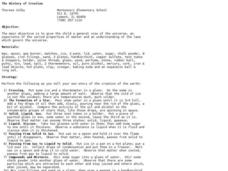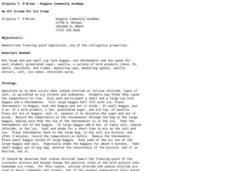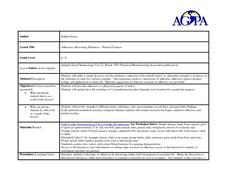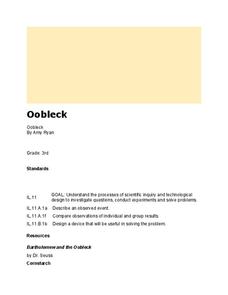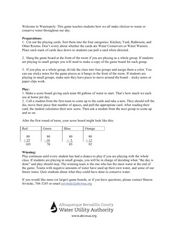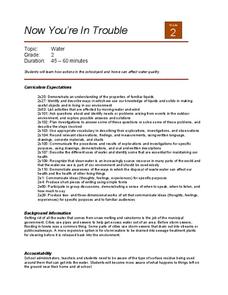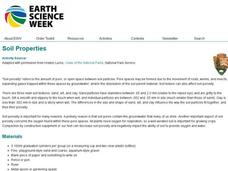Curated OER
The Open Ocean, What is it and How Does it Change?
Students investigate the ocean environment. In this ocean lesson, students discover the physical properties of the ocean. Over two days, students work in small groups investigating ocean maps and creating water currents.
Curated OER
An Underground River
Seventh graders describe how water flows through the ground, what an aquifer is and what soil properties are used to predict groundwater flow. They consider the affects of pollution on groundwater supplies and write a letter drawing...
Curated OER
Scientific Method
Young scholars conduct an experiment and complete a chart demonstrating some of the basic properties and components of water via the scientific method. They encompass strategies such as questioning, making predictions,...
Curated OER
One World Ocean
Students compare and contrast the properties of salt water in the oceans/seas and freshwater elsewhere on the planet. They also analyze mixing caused by currents in the ocean, including the effects of warm and cold water as well as with...
Curated OER
The History of Creation
Students explore the properties of matter. For this lesson about matter, students will do a series of experiments to enable them to understand about creation of the universe. In these some of the experiments students will makes stars,...
Curated OER
Oceanography: Density: Designing a Hydrometer Lab
Middle schoolers explore water density and design a hydrometer to measure density. This activity is part of Ocean World's home site and excellent resources and links are provided.
Curated OER
Watershed Lesson Plan
Students are introduced to the concepts of a watershed, stream flow and water quality. This five-day plan is an excellent way to introduce students to the concepts involved. They create their own watershed using a paper bag, water and...
Curated OER
Change It
Fourth graders expand their knowledge about how the physical properties of a substances can be changed. They are given multiple opportunities, using first-hand experiences and familiar objects in different contexts, to identify...
Curated OER
The Scientific Method Using Mystery Powders
Students use the scientific method to determine physical and chemical properties of unknown substances. In this scientific method lesson plan, students discuss chemical and physical properties of substances as a class after a...
Curated OER
We All Scream for Ice Cream
Students investigate the freezing point depression of water while making ice cream. In this colligative properties lesson plan, students make ice cream using ice, salt and water to freeze milk and sugar. They measure the temperature of...
Curated OER
Local Hydrologic Cycle
Students draw the water cycle as it occurs in their community. In this water cycle lesson, students observe demonstrations of sublimation and infiltration. They also use photographs or their own drawings of their environment to label...
Curated OER
Air Is there
Learners experiment to observe air and its mass. In this air lesson, students use the scientific method to complete experiments that demonstrate the properties of air. Learners view a video as follow-up.
Curated OER
Pass the Jug
Students discuss water rights. In this science lesson, students simulate an exercise whereby they begin to understand the meaning of water allocation and limited water supplies by actually passing out water from a jug.
Curated OER
Is the Hudson River Too Salty to Drink?
Students explore reasons for varied salinity in bodies of water. In this geographical inquiry lesson, students use a variety of visual and written information including maps, data tables, and graphs, to form a hypothesis as to why the...
Curated OER
To Float or Not to Float, That is the Question?
Ninth graders develop operational definition of density, do computations using density equation, categorize pieces of matter as being able to float on
water or not, based on density, explain why some objects sink or float based on...
Curated OER
Hydrologic Cycle Scavenger Hunt
Students explore the water cycle using educational resources. In this water cycle instructional activity, students use a global climate DVD to complete a scavenger hunt on the hydrologic (water) cycle.
Curated OER
Adhesives: Measuring Stickiness
Students test the stickiness of natural substances. In this adhesion as a property of matter instructional activity, students build a tool to test the adhesion of natural "glues" such as honey, peanut butter, flour and water paste, and...
Curated OER
Oobleck
Students explore "matter." In this literacy and three states of matter lesson, students listen to Bartholomew and the Oobleck by Dr. Seuss, then work in groups to explore "oobleck" (cornstarch and water mixture) with their five senses....
Curated OER
Wateropoly: Life in the Desert
Students explore water properties by participating in a drought related board game. In this water conservation lesson, students play a game titled "wateropoly" which is based on the classic board game Monopoly. Students utilize cards and...
Curated OER
Now You're In Trouble
Second graders study how actions in the schoolyard and home can affect water quality. They discuss how rainwater can clean plants and sidewalks on its way to storm sewers. They draw an example of a simple maze that represents the maze...
Curated OER
Changes in Nature
Fifth graders identify the chemical and physical changes in the water cycle, carbon cycle, and the effects of weathering. They analyze the periodic table, and observe how vinegar reacts with limestone in a chemical reaction that causes...
Curated OER
Soil Properties
Students explore the porosity of soil. In this soil instructional activity, students conduct an experiment which shows the porosity of different types of soil. They use sand, silt, and clay to see how soil particles are more or less...
Curated OER
Gas Laws and Alka-Seltzer Rockets
Students investigate the Ideal Gas Law. For this three states of matter lesson, students create Alka-Seltzer rockets using film canisters. Students record observations and data according to the scientific method and explain the gas...
Curated OER
Particulate Matter
Seventh graders examine the different types of pollutants. In this environmental science lesson, 7th graders observe particulate matter under a microscope. They explain how these can affect once health when breathed in large quantities...






